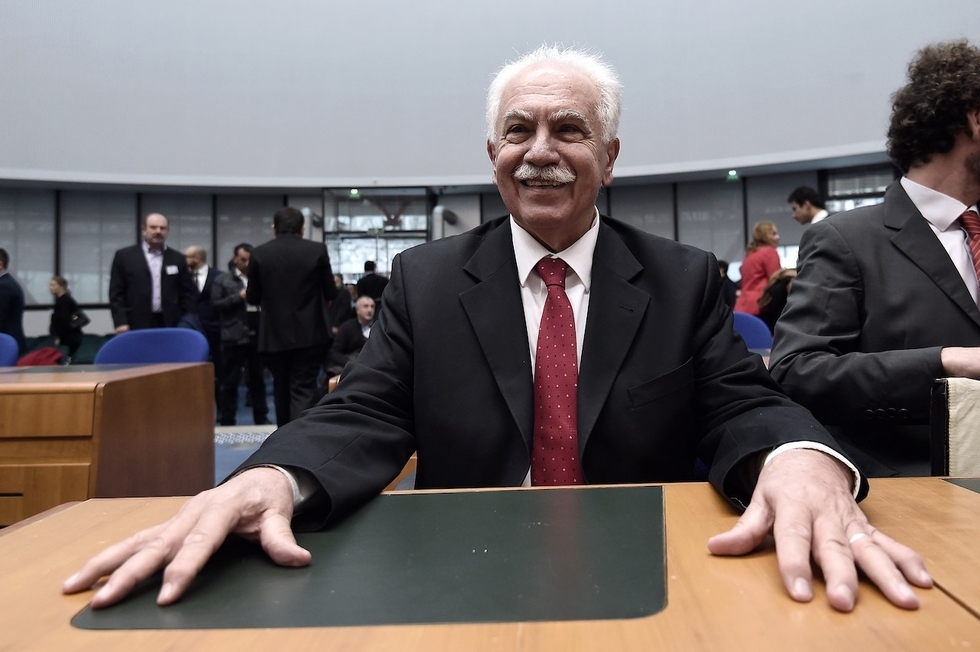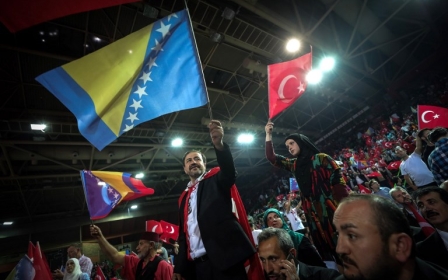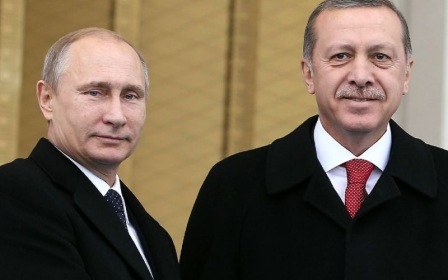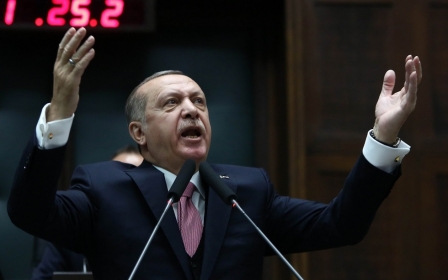Turkish elections: The fringe nationalist facing a polling day pummelling

The name Dogu Perincek probably doesn't ring many bells outside of Turkey. The leader of the Patriotic Party, which has no MPs and controls no local constituencies, would seem far from the reins of power or the media spotlight.
Although he is one of five candidates hoping to challenge Recep Tayyip Erdogan for the presidency of Turkey in the 24 June elections, his unusual brand of Turkish ultra-nationalism, Maoist leftism and ultra-secularism places him far out on the political fringes for most voters.
Among his promises on the campaign trail so far have been a pledge to ban the pro-Kurdish People's Democracy Party (HDP), to invite Syrian President Bashar al-Assad to Ankara, to deepen military and economic ties with Russia, and to push the Turkish army to drive the pro-Kurdish People's Protection Units (YPG) out of northern Syria.
Following reports that French soldiers were being sent to northern Syrian to bolster Kurdish forces there, he said that if elected those soldiers would leave Syria "in coffins".
Nonetheless, he appears set to come last in the presidential race, with most polls suggesting that Perincek will struggle to win the support of even 0.5 percent of voters.
But Perincek has long been a colourful presence in the Turkish media spotlight and, since the July 2016 coup attempt and the deterioration of relations between Turkey and the EU and US, his Eurasianist foreign policy perspective has given him influence and connections well beyond what his stature would suggest.
His influence has grown to the extent that, according to military analyst Metin Gurcan, his supporters have infiltrated the "upper echelons of the state's security and intelligence services" as Erdogan sought to purge the judiciary and civil service of supporters of the US-based cleric Fethullah Gulen.
Everyone knows the US is behind the separatist terror in Turkey. IS and other terrorist organisations serve for division of Iraq and Syria and therefore the Kurdistan plan
- Dogu Perincek
For Perincek, the ultimate enemy is US imperialism, which he sees as attempting to destroy the Turkish Republic through support for Kurdish aspirations in the Middle East.
"The US aims to build a second Israel on lands of Iraq, Syria, Turkey and Iran with its attacks which started in 1991 with the Gulf War," he told Middle East Eye in an interview conducted prior to the election campaign. "An Israel whose population is Muslim!"
He argued that the US had conspired to create what he called "Barzanistan" in northern Iraq, referring to the former president of the semi-autonomous Kurdistan Regional Government (KRG), as the beginning of a plan that would see the whole region disunited and vulnerable to "imperialist" takeover.
"After 2011, they [the US] forged a civil war in Syria and started moving towards creating the USA–Israel corridor which will carry Barzanistan to the east of the Mediterranean region. They now aim to provide oil to Kurdistan by annexing Kirkuk, the US and Israel use PKK as their main pawn in the 'Kurdistan' plans."
He added that he believed the US was responsible for the actions of the Islamic State group, in his mind another pawn to divide Turkey and the region.
"Everyone knows the US is behind the separatist terror in Turkey. IS and other terrorist organisations serve for division of Iraq and Syria and therefore the Kurdistan plan," he said.
Perincek's plan, if he is elected, is to move Turkey away from the US and Europe and into the sphere of China and Russia. Among his promises is to withdraw Turkey from NATO and join the Shanghai Cooperation Organisation, a political and security alliance of Eurasian states.
"Turkey will not accept entering into the EU and being managed from Brussels," he told MEE.
The 'imperialist lie'
The rise of perceived threats to Turkey's sovereignty and security have made Perincek one of the ruling Justice and Development Party's (AKP) most unlikely allies - on the face of it, the Islamist-rooted arch-capitalist Erdogan might seem like the natural enemy of the ultra-secular anti-capitalist Perincek.
But Perincek's politics can also be seen as somewhat contradictory; a self-declared "scientific socialist" with roots in Maoism, he also espouses a firm Turkish nationalist line staunchly opposed to Kurdish devolution and is happy to lay into opponents who besmirch the character of the republic.
A figure on the Turkish political scene since the 1960s, Perincek hit the international headlines in 2015 after he won a case in the European Court of Human Rights defending his right to deny that the mass killings of Armenians by the Ottoman empire during the First World War amounted to genocide.
In 2007 a Swiss court had sentenced him for "genocide denial" after he described the Armenian genocide as a "great international lie” during a rally in Lausanne in 2005.
Perincek's appeal gained publicity when Armenia was represented in the case by famed human rights lawyer Amal Clooney.
He also spent six years in jail after being prosecuted in the notorious Ergenekon trials in 2008, accused of being part of a shady conspiracy to overthrow the government. At the time, the trials were driven by judges associated with the Gulenists, who were then allied to the ruling AKP.
Since then, however, the AKP and Gulenists have had a dramatic falling out, which peaked after the failed 15 July 2016 coup attempt, which the AKP blamed on Gulenist elements in the military.
Perincek has now found himself an ally of the government against his old enemies, and a tentative understanding between Erdogan and Perincek has been forged, according to analysts.
"They are not his core people or inner circle. But Erdogan does build political alliances with various groups, depending on the context, and 'uses' them," said Mustafa Akyol, a Turkish writer and political commentator, speaking to MEE.
"He developed an alliance with [the Eurasianists] since the big fallout with the Gulenists, who were the Eurasianists’ sworn enemy. He empowered them in the bureaucracy, the judiciary, and allowed them have some voice in the media. He apparently also used them for restoring ties with Russia and even for some backdoor diplomacy with [Syrian President] Assad."
However, he pointed out that the alliance was "neither very stable nor fully trust-based".
One major point of difference exists over the perceived threat of Islamisation in Turkey, but unlike most Perincek does not lay the blame for this squarely at the door of the AKP, but with the US.
"The word 'threat' is insufficient. Secularism is being destroyed. This an ongoing process, which started after 1945, when Turkey entered into close relations with the US," he said. "But especially after 1980, and most severely since 2002 and under the rule of AKP, fundamentalism has gained power in the state and in the society."
However, he said that Turkey would "very soon" see a resolution to this problem.
Some analysts argue that even though Perincek's influence is still marginal, his foreign policy aspirations have effectively been adopted by Turkey, even if the AKP has yet to exit NATO and cancel ascension talks with the EU.
Shortly after announcing his intention to run in the election, Perincek announced that the US and it allies were defeated in the Middle East and that his Eurasianist vision was rapidly becoming a reality.
"The Atlantic era is over. America's claims to rulership are now invalid. The United States has been beaten in our region."
New MEE newsletter: Jerusalem Dispatch
Sign up to get the latest insights and analysis on Israel-Palestine, alongside Turkey Unpacked and other MEE newsletters
Middle East Eye delivers independent and unrivalled coverage and analysis of the Middle East, North Africa and beyond. To learn more about republishing this content and the associated fees, please fill out this form. More about MEE can be found here.




